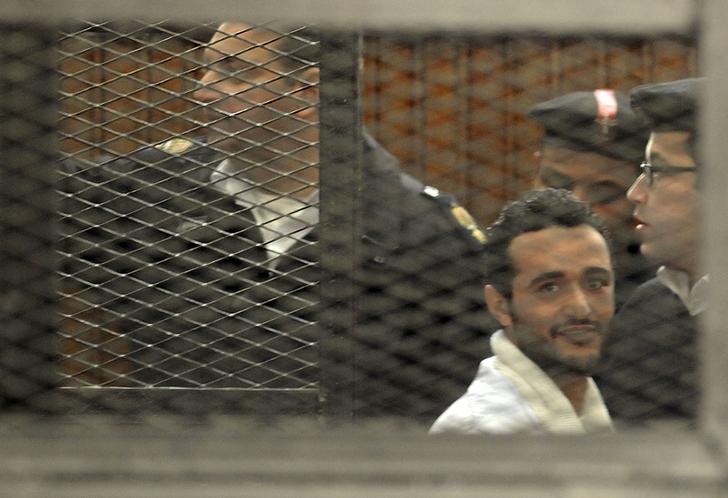Latest NEWS
- Aswat Masriya, the last word
- Roundup of Egypt's press headlines on March 15, 2017
- Roundup of Egypt's press headlines on March 14, 2017
- Former Egyptian President Hosni Mubarak to be released: lawyer
- Roundup of Egypt's press headlines on March 13, 2017
- Egypt's capital set to grow by half a million in 2017
- Egypt's wheat reserves to double with start of harvest -supply min
- Roundup of Egypt's press headlines on March 12, 2017
Detained activist Ahmed Douma ends hunger strike: source

Political activist Ahmed Douma of the 6 April movement looks on behind bars in Cairo, December 22, 2013. REUTERS/Stringer
CAIRO, Sept 27 (Aswat Masriya) - Detained political activist Ahmed Douma ended his hunger strike on Saturday after receiving "advice and guidance" from prison administration, Colonel Mohamed Elewa, head of the Prison Authority’s Public Relations Unit, said.
"Douma has responded [to advice] and eaten light meals, such as soup and yoghurt, in light of his medical state," Elewa told Aswat Masriya, adding that Douma has admitted resuming eating prison food in an official record.
Douma had previously undergone medical examination at Manial University Hospital, which proved his health condition stable and within normal levels, Elewa added.
The activist went on hunger strike on August 28 to protest his imprisonment. He arrived in an ambulance car to the court where his trial was held on September 17 due to his deteriorating health condition, a security source told Aswat Masriya.
Douma's lawyer said his client lost a lot of weight in a short amount of time and looked exhausted.
The court resumed the trial of Douma and 268 other defendants over charges of illegal assembly, possession of bladed weapons and Molotov cocktails, assaulting army and police personnel and attacking governmental institutions in December 2011 during the "cabinet clashes".
Clashes broke out between protesters and security forces outside the cabinet headquarters in December 2011, leaving at least three people dead and 255 wounded.
The National Council for Human Rights (NCHR) recommended medical supervision at an external hospital for Douma and other hunger-striking prisoners earlier this month.
Douma's wife filed a report to the prosecutor-general against the interior minister and his deputy for prison affairs for their tenacity in the matter of transferring Douma to the hospital after his health condition worsened.
Hunger strikes have lately become a common tool to protest detention, used by those arrested for political reasons.










